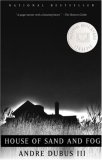Summary | Excerpt | Reading Guide | Reviews | Readalikes | Genres & Themes | Author Bio

But today and all week, I do not even attempt to look for a position. My daughter Soraya was married on Saturday and I feel already there is a hole in my chest with her gone. There is also a hole in our home, but now we are free to leave that place that has cost me three thousand dollars per month for four years. And I turn straight to this area called Legal Notices/Auctions. This is a part of the paper I have never before investigated. I have been speaking and reading English for over twenty-five years but the language of law in both our countries seems designed to confuse. Of course I know what is an auction, and this morning, when the air was still cool and we garbage soldiers sat upon the metal floor of the highway truck as it drove under the tall span of the golden bridge, the smell of the ocean behind us, I held the newspaper tight in my lap so no wind would touch it and that is when I saw the short notice of Seized Property for Sale, a three-bedroom home. Though of course this has not been my plan. My plan has been highly simple: stop spending money from home so we may use it to start some sort of business. I have been looking into many possibilities; a small restaurant, or a laundry, a video store perhaps. Though I know these American papers, I know what they say of this economy, still I see small shops going out of business on both sides of the bay. And of course we have no money for to buy a house as well, but there are many auctions in my country. There it is known as the legal way to rob.
Tran is eating rice and vegetables with a large plastic spoon from waxy paper in his lap. He is very small and yellow-brown. There are deep lines around his mouth and between his eyes upon his forehead. He smiles and nods at my own food. I eat rice also. Soraya used to save the tadiq for me, the hard cake of rice at the bottom of the pot Americans throw away, but for us, for Persians, it is the jewel. We cook it with very much butter so when the pot is turned upside down all the rice comes out onto the plate, even the brown and burned part we call tadiq. Now, each night, my wife, Nadereh, saves half for my lunch. She also packs for me radishes, bread, one apple, and a small thermos of hot tea. The Panamanians watch me pour the steaming tea into my cup and they shake their heads as if I am a stupid child. They do not know what I know of the heat, that there must be a fire inside you to match the one outdoors. At Mehrabad, my base near Tehran, sometimes the tarmac would become so bright off the sands even we officers, with our European sunglasses, would close our eyes. Of course we spent most of the days inside our air-conditioned offices. Many times there, between appointments or briefings, I would have my attendant phone Nadi at our home in the capital city. She and I would speak of the small events of the day, then she would let the children to the telephone. One morning, when my son Esmail was one and a half years, he said his first word to me, then, over the wire: "Bawbaw-joon," father most dear.
With my fingers I tear out the small notice of the home to be auctioned and place the paper in my front shirt pocket beneath my vest. Today is Wednesday, the only day I do not work my night position at a small convenience store in El Cerrito, a neighborhood where I am not likely to see any Persian people, not the rich ones, the pooldar, those who live alongside us in that high-rise of overpriced apartments on its hill overlooking the bay and San Francisco and the Golden Gate Bridge. In four years, this two-bedroom flat has cost me over one hundred forty thousand dollars in rent. But I will not let myself think of that now. I cannot.
Tran finishes his lunch. With his fingers he brushes off the wax paper and folds it neatly before putting it back into the bag with the plastic spoon. He pulls out a chocolate bar and offers to me a portion, but I shake my head as I sip my tea. I know that he will use that tired paper for his lunch tomorrow, and the spoon will probably last him half the year. I know, like me, he is a father, perhaps even a grandfather.And perhaps I will be a grandfather soon as well.
Excerpted from House of Sand and Fog by Andre Dubus III Copyright© 1999 by Andre Dubus III. Excerpted by permission of Vintage, a division of Random House, Inc. All rights reserved. No part of this excerpt may be reproduced or reprinted without permission in writing from the publisher.
Your guide toexceptional books
BookBrowse seeks out and recommends the best in contemporary fiction and nonfiction—books that not only engage and entertain but also deepen our understanding of ourselves and the world around us.